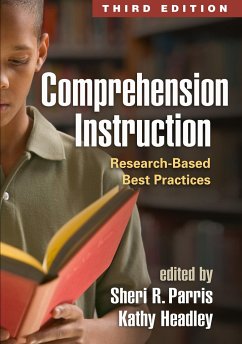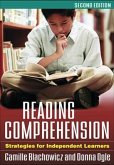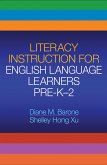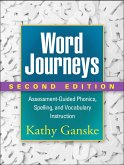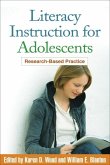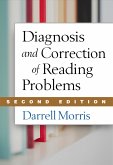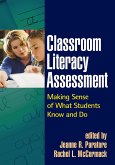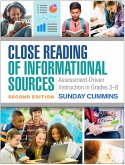Comprehension Instruction
Research-Based Best Practices
Herausgeber: Parris, Sheri R; Headley, Kathy
Comprehension Instruction
Research-Based Best Practices
Herausgeber: Parris, Sheri R; Headley, Kathy
- Broschiertes Buch
Andere Kunden interessierten sich auch für
![Reading Comprehension Reading Comprehension]() Camille BlachowiczReading Comprehension54,99 €
Camille BlachowiczReading Comprehension54,99 €![Literacy Instruction for English Language Learners, Pre-K-2 Literacy Instruction for English Language Learners, Pre-K-2]() Diane M BaroneLiteracy Instruction for English Language Learners, Pre-K-248,99 €
Diane M BaroneLiteracy Instruction for English Language Learners, Pre-K-248,99 €![Word Journeys Word Journeys]() Kathy GanskeWord Journeys59,99 €
Kathy GanskeWord Journeys59,99 €![Literacy Instruction for Adolescents Literacy Instruction for Adolescents]() Literacy Instruction for Adolescents78,99 €
Literacy Instruction for Adolescents78,99 €![Diagnosis and Correction of Reading Problems Diagnosis and Correction of Reading Problems]() Darrell MorrisDiagnosis and Correction of Reading Problems48,99 €
Darrell MorrisDiagnosis and Correction of Reading Problems48,99 €![Classroom Literacy Assessment Classroom Literacy Assessment]() Classroom Literacy Assessment51,99 €
Classroom Literacy Assessment51,99 €![Close Reading of Informational Sources Close Reading of Informational Sources]() Sunday CumminsClose Reading of Informational Sources44,99 €
Sunday CumminsClose Reading of Informational Sources44,99 €-
-
-
Produktdetails
- Verlag: Guilford Publications
- 3rd edition
- Seitenzahl: 418
- Erscheinungstermin: 7. Juli 2015
- Englisch
- Abmessung: 257mm x 175mm x 20mm
- Gewicht: 726g
- ISBN-13: 9781462520787
- ISBN-10: 1462520782
- Artikelnr.: 41756872
Hinweis: Dieser Artikel kann nur an eine deutsche Lieferadresse ausgeliefert werden.
- Herstellerkennzeichnung
- Produktsicherheitsverantwortliche/r
- Europaallee 1
- 36244 Bad Hersfeld
- gpsr@libri.de
Sheri R. Parris, PhD, is an Associate Research Scientist with the Institute of Child Development at Texas Christian University and Adjunct Professor in the Master of Education program at Concordia University Texas. Previously, she was a high school English language arts teacher and a middle school computer literacy teacher, and held a variety of educational research positions. Dr. Parris's areas of expertise include reading comprehension, adolescent literacy, and neuroscience as it relates to literacy, learning, and child development, with an emphasis on at-risk populations. She has coauthored numerous book chapters and journal articles. Kathy Headley, EdD, is Associate Dean for Research and Graduate Studies in the College of Health, Education, and Human Development and Professor of Literacy in the Eugene T. Moore School of Education at Clemson University. Dr. Headley began her career as a teacher and reading specialist in Georgia. Her areas of expertise include adolescent literacy and writing, with specialized interests in comprehension and vocabulary. She has published articles in leading literacy journals and served on the Board of Directors of the International Reading Association.
Introduction, Sheri R. Parris and Kathy Headley
I. Comprehension Instruction within Theoretical Frameworks
1. Beyond Borders: A Global Perspective on Reading Comprehension, Sheri R.
Parris, Linda B. Gambrell, and Andreas Schleicher
2. Comprehension Instruction from a Critical Theory Viewpoint, Bogum Yoon
3. Using Inquiry Dialogue to Promote the Development of Argument Skills:
Possibilities, Challenges, and New Directions, Alina Reznitskaya, Judy
Yu-Li Hsu, and Richard C. Anderson
4. Reading Comprehension, Embodied Cognition, and Dual Coding Theory, Mark
Sadoski
5. Executive Function and Reading Comprehension: The Critical Role of
Cognitive Flexibility, Kelly B. Cartwright
6. Metacognition in Comprehension Instruction: New Directions, Linda Baker,
Laura U. DeWyngaert, and Alisa Zeliger-Kandasamy
7. Constructivist Theory as a Framework for Instruction and Assessment of
Reading Comprehension, Donna Caccamise, Angela Friend, Megan K.
Littrell-Baez, and Eileen Kintsch
II. Comprehension Instruction Contexts
8. Comprehension Instruction within the Context of the Common Core, Evelyn
Ford-Connors, Dana A. Robertson, Christine Leighton, Jeanne R. Paratore, C.
Patrick Proctor, and Michelle Carney
9. Using Neuroscience to Inform Comprehension Instruction, Sheri R. Parris
and Cathy Collins Block
10. Comprehension Instruction in Culturally Responsive Classrooms: A Review
of Research and Practice, Ellen McIntyre
11. New Insights on Motivation in the Literacy Classroom, Jacquelynn A.
Malloy
12. Research on Response-to-Intervention Supplemental Interventions:
Where's the Comprehension Instruction?, Deborah MacPhee, Elizabeth Bemiss,
and Diane Stephens
13. Comprehension Instruction for At-Risk Students, Irma F. Brasseur-Hock,
Michael F. Hock, and Donald D. Deshler
14. Comprehension Instruction for English Language Learners: New
Perspectives, New Challenges, Robert Rueda, Norman J. Unrau, and Elena Son
III. Comprehension Instruction in Action
15. Best Practices for Comprehension Instruction in the Elementary
Classroom, Nell K. Duke and Nicole M. Martin
16. Fiction Comprehension Instruction: Attending to Characters' and
Readers' Emotional States, Laura B. Smolkin and Erin M. McTigue
17. Improving Comprehension of Informational Texts in the Elementary
Classroom, Lisa S. Pao and Joanna P. Williams
18. Best Practices for Comprehension Instruction in the Secondary
Classroom, Douglas Fisher and Nancy Frey
19. Improving Comprehension of Fictional Texts in the Secondary Classroom,
Tiffany Ohlson, Heather Monroe-Ossi, and Sheri R. Parris
20. Improving Comprehension of Informational Texts in the Secondary
Classroom, Vicki A. Jacobs and Jacy Ippolito
IV. Multimodal Literacies and Comprehension
21. Multimodal Literacy: Best Practices for Comprehension Instruction,
Sally Lamping
22. Beyond Differentiation: Multimodal Literacy Learning, B. P. Laster
23. Research on Instruction and Assessment in the New Literacies of Online
Reading Comprehension, Jill Castek, Julie Coiro, Laurie A. Henry, Donald J.
Leu, and Douglas K. Hartman
24. Reading Digital: Designing and Teaching with eBooks and Digital Text,
Bridget Dalton and David Rose
25. Games and Comprehension: The Importance of Specialist Language, James
Paul Gee
26. New Literacies and Comprehension: Resources for Educators, Jan Lacina
27. Summing Up: Putting Comprehension Instruction in Context, Kathy Headley
& Sheri R. Parris
I. Comprehension Instruction within Theoretical Frameworks
1. Beyond Borders: A Global Perspective on Reading Comprehension, Sheri R.
Parris, Linda B. Gambrell, and Andreas Schleicher
2. Comprehension Instruction from a Critical Theory Viewpoint, Bogum Yoon
3. Using Inquiry Dialogue to Promote the Development of Argument Skills:
Possibilities, Challenges, and New Directions, Alina Reznitskaya, Judy
Yu-Li Hsu, and Richard C. Anderson
4. Reading Comprehension, Embodied Cognition, and Dual Coding Theory, Mark
Sadoski
5. Executive Function and Reading Comprehension: The Critical Role of
Cognitive Flexibility, Kelly B. Cartwright
6. Metacognition in Comprehension Instruction: New Directions, Linda Baker,
Laura U. DeWyngaert, and Alisa Zeliger-Kandasamy
7. Constructivist Theory as a Framework for Instruction and Assessment of
Reading Comprehension, Donna Caccamise, Angela Friend, Megan K.
Littrell-Baez, and Eileen Kintsch
II. Comprehension Instruction Contexts
8. Comprehension Instruction within the Context of the Common Core, Evelyn
Ford-Connors, Dana A. Robertson, Christine Leighton, Jeanne R. Paratore, C.
Patrick Proctor, and Michelle Carney
9. Using Neuroscience to Inform Comprehension Instruction, Sheri R. Parris
and Cathy Collins Block
10. Comprehension Instruction in Culturally Responsive Classrooms: A Review
of Research and Practice, Ellen McIntyre
11. New Insights on Motivation in the Literacy Classroom, Jacquelynn A.
Malloy
12. Research on Response-to-Intervention Supplemental Interventions:
Where's the Comprehension Instruction?, Deborah MacPhee, Elizabeth Bemiss,
and Diane Stephens
13. Comprehension Instruction for At-Risk Students, Irma F. Brasseur-Hock,
Michael F. Hock, and Donald D. Deshler
14. Comprehension Instruction for English Language Learners: New
Perspectives, New Challenges, Robert Rueda, Norman J. Unrau, and Elena Son
III. Comprehension Instruction in Action
15. Best Practices for Comprehension Instruction in the Elementary
Classroom, Nell K. Duke and Nicole M. Martin
16. Fiction Comprehension Instruction: Attending to Characters' and
Readers' Emotional States, Laura B. Smolkin and Erin M. McTigue
17. Improving Comprehension of Informational Texts in the Elementary
Classroom, Lisa S. Pao and Joanna P. Williams
18. Best Practices for Comprehension Instruction in the Secondary
Classroom, Douglas Fisher and Nancy Frey
19. Improving Comprehension of Fictional Texts in the Secondary Classroom,
Tiffany Ohlson, Heather Monroe-Ossi, and Sheri R. Parris
20. Improving Comprehension of Informational Texts in the Secondary
Classroom, Vicki A. Jacobs and Jacy Ippolito
IV. Multimodal Literacies and Comprehension
21. Multimodal Literacy: Best Practices for Comprehension Instruction,
Sally Lamping
22. Beyond Differentiation: Multimodal Literacy Learning, B. P. Laster
23. Research on Instruction and Assessment in the New Literacies of Online
Reading Comprehension, Jill Castek, Julie Coiro, Laurie A. Henry, Donald J.
Leu, and Douglas K. Hartman
24. Reading Digital: Designing and Teaching with eBooks and Digital Text,
Bridget Dalton and David Rose
25. Games and Comprehension: The Importance of Specialist Language, James
Paul Gee
26. New Literacies and Comprehension: Resources for Educators, Jan Lacina
27. Summing Up: Putting Comprehension Instruction in Context, Kathy Headley
& Sheri R. Parris
Introduction, Sheri R. Parris and Kathy Headley
I. Comprehension Instruction within Theoretical Frameworks
1. Beyond Borders: A Global Perspective on Reading Comprehension, Sheri R.
Parris, Linda B. Gambrell, and Andreas Schleicher
2. Comprehension Instruction from a Critical Theory Viewpoint, Bogum Yoon
3. Using Inquiry Dialogue to Promote the Development of Argument Skills:
Possibilities, Challenges, and New Directions, Alina Reznitskaya, Judy
Yu-Li Hsu, and Richard C. Anderson
4. Reading Comprehension, Embodied Cognition, and Dual Coding Theory, Mark
Sadoski
5. Executive Function and Reading Comprehension: The Critical Role of
Cognitive Flexibility, Kelly B. Cartwright
6. Metacognition in Comprehension Instruction: New Directions, Linda Baker,
Laura U. DeWyngaert, and Alisa Zeliger-Kandasamy
7. Constructivist Theory as a Framework for Instruction and Assessment of
Reading Comprehension, Donna Caccamise, Angela Friend, Megan K.
Littrell-Baez, and Eileen Kintsch
II. Comprehension Instruction Contexts
8. Comprehension Instruction within the Context of the Common Core, Evelyn
Ford-Connors, Dana A. Robertson, Christine Leighton, Jeanne R. Paratore, C.
Patrick Proctor, and Michelle Carney
9. Using Neuroscience to Inform Comprehension Instruction, Sheri R. Parris
and Cathy Collins Block
10. Comprehension Instruction in Culturally Responsive Classrooms: A Review
of Research and Practice, Ellen McIntyre
11. New Insights on Motivation in the Literacy Classroom, Jacquelynn A.
Malloy
12. Research on Response-to-Intervention Supplemental Interventions:
Where's the Comprehension Instruction?, Deborah MacPhee, Elizabeth Bemiss,
and Diane Stephens
13. Comprehension Instruction for At-Risk Students, Irma F. Brasseur-Hock,
Michael F. Hock, and Donald D. Deshler
14. Comprehension Instruction for English Language Learners: New
Perspectives, New Challenges, Robert Rueda, Norman J. Unrau, and Elena Son
III. Comprehension Instruction in Action
15. Best Practices for Comprehension Instruction in the Elementary
Classroom, Nell K. Duke and Nicole M. Martin
16. Fiction Comprehension Instruction: Attending to Characters' and
Readers' Emotional States, Laura B. Smolkin and Erin M. McTigue
17. Improving Comprehension of Informational Texts in the Elementary
Classroom, Lisa S. Pao and Joanna P. Williams
18. Best Practices for Comprehension Instruction in the Secondary
Classroom, Douglas Fisher and Nancy Frey
19. Improving Comprehension of Fictional Texts in the Secondary Classroom,
Tiffany Ohlson, Heather Monroe-Ossi, and Sheri R. Parris
20. Improving Comprehension of Informational Texts in the Secondary
Classroom, Vicki A. Jacobs and Jacy Ippolito
IV. Multimodal Literacies and Comprehension
21. Multimodal Literacy: Best Practices for Comprehension Instruction,
Sally Lamping
22. Beyond Differentiation: Multimodal Literacy Learning, B. P. Laster
23. Research on Instruction and Assessment in the New Literacies of Online
Reading Comprehension, Jill Castek, Julie Coiro, Laurie A. Henry, Donald J.
Leu, and Douglas K. Hartman
24. Reading Digital: Designing and Teaching with eBooks and Digital Text,
Bridget Dalton and David Rose
25. Games and Comprehension: The Importance of Specialist Language, James
Paul Gee
26. New Literacies and Comprehension: Resources for Educators, Jan Lacina
27. Summing Up: Putting Comprehension Instruction in Context, Kathy Headley
& Sheri R. Parris
I. Comprehension Instruction within Theoretical Frameworks
1. Beyond Borders: A Global Perspective on Reading Comprehension, Sheri R.
Parris, Linda B. Gambrell, and Andreas Schleicher
2. Comprehension Instruction from a Critical Theory Viewpoint, Bogum Yoon
3. Using Inquiry Dialogue to Promote the Development of Argument Skills:
Possibilities, Challenges, and New Directions, Alina Reznitskaya, Judy
Yu-Li Hsu, and Richard C. Anderson
4. Reading Comprehension, Embodied Cognition, and Dual Coding Theory, Mark
Sadoski
5. Executive Function and Reading Comprehension: The Critical Role of
Cognitive Flexibility, Kelly B. Cartwright
6. Metacognition in Comprehension Instruction: New Directions, Linda Baker,
Laura U. DeWyngaert, and Alisa Zeliger-Kandasamy
7. Constructivist Theory as a Framework for Instruction and Assessment of
Reading Comprehension, Donna Caccamise, Angela Friend, Megan K.
Littrell-Baez, and Eileen Kintsch
II. Comprehension Instruction Contexts
8. Comprehension Instruction within the Context of the Common Core, Evelyn
Ford-Connors, Dana A. Robertson, Christine Leighton, Jeanne R. Paratore, C.
Patrick Proctor, and Michelle Carney
9. Using Neuroscience to Inform Comprehension Instruction, Sheri R. Parris
and Cathy Collins Block
10. Comprehension Instruction in Culturally Responsive Classrooms: A Review
of Research and Practice, Ellen McIntyre
11. New Insights on Motivation in the Literacy Classroom, Jacquelynn A.
Malloy
12. Research on Response-to-Intervention Supplemental Interventions:
Where's the Comprehension Instruction?, Deborah MacPhee, Elizabeth Bemiss,
and Diane Stephens
13. Comprehension Instruction for At-Risk Students, Irma F. Brasseur-Hock,
Michael F. Hock, and Donald D. Deshler
14. Comprehension Instruction for English Language Learners: New
Perspectives, New Challenges, Robert Rueda, Norman J. Unrau, and Elena Son
III. Comprehension Instruction in Action
15. Best Practices for Comprehension Instruction in the Elementary
Classroom, Nell K. Duke and Nicole M. Martin
16. Fiction Comprehension Instruction: Attending to Characters' and
Readers' Emotional States, Laura B. Smolkin and Erin M. McTigue
17. Improving Comprehension of Informational Texts in the Elementary
Classroom, Lisa S. Pao and Joanna P. Williams
18. Best Practices for Comprehension Instruction in the Secondary
Classroom, Douglas Fisher and Nancy Frey
19. Improving Comprehension of Fictional Texts in the Secondary Classroom,
Tiffany Ohlson, Heather Monroe-Ossi, and Sheri R. Parris
20. Improving Comprehension of Informational Texts in the Secondary
Classroom, Vicki A. Jacobs and Jacy Ippolito
IV. Multimodal Literacies and Comprehension
21. Multimodal Literacy: Best Practices for Comprehension Instruction,
Sally Lamping
22. Beyond Differentiation: Multimodal Literacy Learning, B. P. Laster
23. Research on Instruction and Assessment in the New Literacies of Online
Reading Comprehension, Jill Castek, Julie Coiro, Laurie A. Henry, Donald J.
Leu, and Douglas K. Hartman
24. Reading Digital: Designing and Teaching with eBooks and Digital Text,
Bridget Dalton and David Rose
25. Games and Comprehension: The Importance of Specialist Language, James
Paul Gee
26. New Literacies and Comprehension: Resources for Educators, Jan Lacina
27. Summing Up: Putting Comprehension Instruction in Context, Kathy Headley
& Sheri R. Parris

